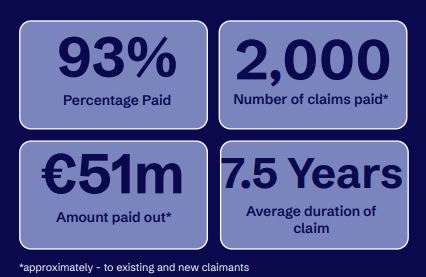How to Answer Life Insurance Health Questions in 2024

Do Life Insurance Providers Pay Claims?
Yeah, I know you’re a bit sceptical, but hear me out…
Our insurers only refuse around 5% of the total life insurance, income protection and serious illness insurance claims they receive.
Let’s take a look at Aviva’s claims statistics for last year as an example:
Income Protection


Life Insurance


Critical Illness Cover


Or, putting a more positive spin on it, they pay 95 in 100 claims.
Not bad, eh?
I bet you thought that number was much lower—you’re not alone; most people think insurers pay only 70 in 100 claims.
Now, you may roll your eyes, scoff, or even LOL at the idea, but the insurance providers say they pay 100% of all valid claims.
They want to pay claims.
You see, the more claims they pay, the greater the trust people have in life insurance.
—
Right, so you know the insurers want to pay claims, which sounds great, but you’re here to find out what you can do to ensure they pay your claim.
How To Answer Life Insurance Health Questions?
Since the Consumer Insurance Contract Act was updated in 2021, the principle of utmost good faith has been replaced with a requirement to answer the specific questions on the application form.
You don’t have to volunteer information if you’re not specifically asked.
The onus is on the insurer to investigate absent or incomplete answers.
Of course, fraudulent, intentional or reckless concealment is not allowed.
In a nutshell:
Only answer the questions the insurers ask.
No need to volunteer additional information.
If more information is required, it’s up to the insurer to request it.
It reminds me of that scene in Braveheart
Stephen :
In order to find his equal, an Irishman is forced to talk to God.
[to the sky]
Stephen :
Yes, Father!
[to Hamish]
Stephen :
The Almighty says,
Don’t change the subject, just answer the fuckin’ question.

What Are Typical Life Insurance Questions?
What was the exact diagnosis?
What treatment did you receive?
How many times and how severe were the symptoms? When did you last have symptoms?
What tests have you had, when were they, and what were the results?
Are there any underlying complications, or did another disease bring on your condition?
Have you made a complete recovery? Have you been discharged from all meds?
You should ask your GP or specialist if you don’t know the answers to these questions.
Otherwise, the insurer will write to your GP, delaying your application.
Generally, all the insurer needs to make a decision is confirmation that your condition is being treated, is stable and that there are no outstanding medical tests.
But if your health condition is complex, the insurer may still revert to your GP for a medical report (PMAR)
Can The Insurer Refuse Cover if I Tell The Truth?
You may think that disclosing an illness risks your chances of getting covered.
And if you can’t get cover, you can’t draw down your mortgage, so you won’t be able to buy a house.
I’m not going to lie to you.
This is a possibility.
But if you get a policy by lying about your application and you die, the policy won’t payout.
If you’re single, you’re probably thinking “meh”.
But if you have a spouse, partner, or children, I’m sure you don’t want to leave them in a financial mess, struggling with the full mortgage on one income.
If the insurers postpone offering cover for a time, then maybe rethink the whole purchase and rent for a while until you can get cover.
But if you have your heart set on a house and you can’t get mortgage insurance, request a waiver from the bank.
Let’s focus on the positives:
The insurers accept around 90% of all applications at the normal price, even where health conditions are disclosed.
So your choices are:
Lie – get a policy at the normal price; die – the insurer refuses the claim.
Tell the truth: pay a higher premium; die – the insurer pays out to clear your mortgage.
Lying may seem easy, but if you have a conscience, believe me, it will eat away at you.


Do Social Smokers Pay More For Mortgage Protection?
I’m only a social smoker
I hear this a lot.
I only smoke at weekends
And this.
Ah sure I might have the odd one when I’m out with the lads
The smoking question is explicit.
If you have smoked/vaped/used nictotine replacement in the last 12 months, you are a smoker.
There is no wriggle room.
Stop fannying about having the odd one; they’re doing you no good anyway; suck up the higher premium for 12 months, then reapply as a non-smoker.
That’s exactly what I had to do!
Even the Irish Ombudsman regards lying about your smoking habits as deliberate non-disclosure.
If you die of any cause, let’s say you get hit by a bus, and the insurer finds out you lied on the smoking question, it will refuse your claim. It doesn’t matter that the cause of death is unrelated to smoking.
What Life Insurance Health Questions Are Most Difficult?
Mental health and alcohol abuse issues (both still taboo subjects in Ireland, unfortunately)
Upcoming investigations (trying to get cover in place before you get bad news)
BMI (some people believe they will lose weight in the future, so they disclose their aspirational weight rather than their current one)
Smoking (see above)
All of the above are personal, private matters which people generally prefer not to discuss.
It’s particularly challenging to share these issues with acquaintances, such as a local broker or the bank manager you regularly see at your kids’ GAA matches!
However, when it comes to life insurance, failing to disclose such information can result in your claim not being paid.
That’s where we come in.
We’re the experts when it comes to arranging your cover if you have a sensitive health issue.
Please scroll through our reviews to see how we have helped hundreds of clients in similar situations.
We’re discreet, professional and, most importantly, anonymous.
We’re an online broker, so we’ll never meet – there’s no chance of an awkward moment down the pub when we bump into each other.
Key Points to Remember:
Only answer the questions the insurers ask.
No need to volunteer additional information.
If more information is required, it’s up to the insurer to request it.
Over to you
Are you worried about how to answer life insurance health questions?
Afraid you may say too much (or too little)
Well, don’t sit there worrying.
Tell me about it!
A problem shared is a problem halved and all that malarkey.
You can find blogs on the 42 most common health issues we advise here.
Or, if you prefer, please complete this questionnaire, and I will run it by my underwriters anonymously and get back to you over email.
Alternatively, you can schedule a callback here
Thanks for reading
Nick
Editor’s Note: We published this blog in 2017 and have updated it regularly since.








